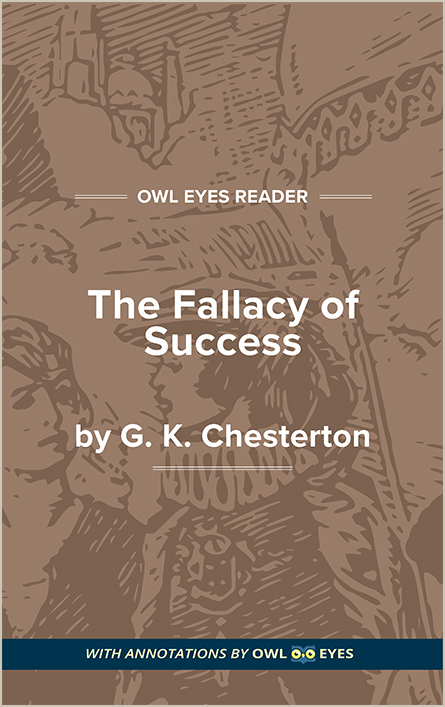Analysis Pages
Rhetorical Devices in The Fallacy of Success
Appeals to Ethos, Pathos, and Logos: Chesterton makes ample use of Aristotle’s three rhetorical appeals to ethos, pathos, and logos. Appealing to ethos to bolster his own credibility, Chesterton displays his familiarity with the literature of “Success” as well as the broader historical and intellectual context in which it exists. Appealing to pathos to reach his audience’s emotions, Chesterton uses sardonic humor as well as rhythmic, musical phrasing. Appealing to logos to invalidate popular claims about “Success,” Chesterton asserts the inherent vagueness and misguidedness of success as such.
Paradox, Parallelism, and Alliteration: Chesterton employs a variety of devices to add weight and zest to his arguments. He often uses paradox, crafting sentences that appear contradictory on the surface but which reveal subtle, counterintuitive truths. He also uses parallelism, layering phrases and sentences with similar structures so as to produce waves of rhythmic momentum. Another technique he often uses is alliteration, combining words with identical opening consonants; alliterative phrases are pleasing to the ear and memorable to the mind, thereby contributing to the effectiveness of the larger argument.
Rhetorical Devices Examples in The Fallacy of Success:
Text of Chesterton's Essay
🔒"(like most other prominent and wealthy persons)..." See in text (Text of Chesterton's Essay)
"some decent little book which told me the rules of the game..." See in text (Text of Chesterton's Essay)
"it would be something like this:..." See in text (Text of Chesterton's Essay)
"You may want a book about jumping; you may want a book about whist; you may want a book about cheating at whist...." See in text (Text of Chesterton's Essay)
"how, if he is a grocer, he may become a sporting yachtsman;..." See in text (Text of Chesterton's Essay)
"They are books showing men how to succeed in everything; they are written by men who cannot even succeed in writing books...." See in text (Text of Chesterton's Essay)
"what shall we say of books that inflame the viler passions of avarice and pride?..." See in text (Text of Chesterton's Essay)
"It is not mere business; it is not even mere cynicism. It is mysticism;..." See in text (Text of Chesterton's Essay)
"(sneaked from the sickening Little Englanders and Pro-Boers)..." See in text (Text of Chesterton's Essay)
"passing over the bad logic and bad philosophy in the phrase,..." See in text (Text of Chesterton's Essay)
"Moreover, the romances of chivalry were at least about chivalry; the religious tracts are about religion...." See in text (Text of Chesterton's Essay)
"They are much more wild than the wildest romances of chivalry and much more dull than the dullest religious tract...." See in text (Text of Chesterton's Essay)

